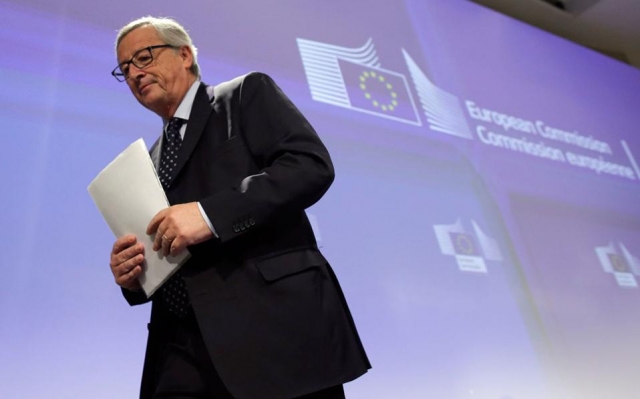photos www.kathimerini.gr, www.freesocial.gr
On the 13th floor of the Βerlaymont building in Brussels, just a few metres from Commission President Jean-Claude Juncker's office, in a guarded room, a plan is kept for Greece's exit from the euro. It was penned within a month by a 15-strong group of the European Commission. The plan offers ways of responding to a possible GREXIT. These responses take into account, however controversial it might sound, even Greece's exit from the Schengen and EU. This is what Kathimerini's correspondent in Brussels Eleni Varvitsioti claims in her report.
Last week, Greece deflected the direct risk of leaving the Eurozone by starting negotiations for a third memorandum. But, as stated European Council President Donald Tusk says, this agreement is only the first step.
Up until the dramatic summit two days after the referendum, there was only hearsay about this plan, with nothing corroborated. But after the meeting finally closed on Wednesday morning, from the bully pulpit of the European Council, Donald Tusk, visibly aggravated by what Tsipras had said, revealed to dozens of journalists that the plan did exist.
According to a European official, at this summit the European Commission already had it in a bound volume, and described it for the Greek prime minister well before the meeting. Jean-Claude Juncker highlighted each and every detail of a possible Grexit, giving Tsipras a chance to understand the legal and political framework of such a decision.

According to the same source – familiar with this long document – it contains the answers to 200 questions that would arise in the event of a Grexit. The issues are interrelated, as an exit from the euro would create a chain of events in a relatively short period - from the introduction of the drachma to the currency control to be imposed along the country's borders. All this will eventually lead to an exit from Schengen as well.
The authors
According to the source, this plan was made in outstanding secrecy. A 15-strong task force of the European Commission, its membership having direct contacts with Greece, was commissioned to put it together. Its members also had close ties with a number of EC senior officials and general directorates. Work on the plan started in late June when the Greek programme was coming to an end, so that the EC could be prepared for a Grexit. It was spurred up on 26 June when the Greek referendum was announced. The task force kept bashing on throughout the referendum weekend, so that two days later, at the summit, the plan was already in its final shape.
According to well-informed sources, the task force worked with 'pained souls' because they couldn't believe things had come that far. Most of them had been directly linked to Greek bailouts. There was still hope in the Commission that a solution would be found, if in the last minute. Its members knew as much as anyone what the consequences of Greece's exit from the Eurozone could be. One of them told the rest: "If this plan were implemented, the roads of Athens would resonate with the rumble of the tanks."
A close shave
Although this plan is now only a somewhat distant possibility, just a few days earlier, in the morning of 7 July, after 17 hours of continuous negotiations at the summit, a senior European official told Kathimerini that an exit from the euro was just an inch away.
Both Tsipras and Merkel wanted a break out of the negotiations. On the one side, Tsipras needed 24 hours to consult his parliament. On the other, Merkel wanted another meeting on Wednesday, two days later. "They were looking for an excuse to disrupt the negotiations," said the source who is familiar with what happened at the meeting. "It was a fairly risky moment, but also very spontaneous, as this was a genuine response to their fatigue and powerlessness."
At the same time, the source says both sides were certain to have reached a deal when they were only €2.5 billion apart from one another.
Donald Tusk, the main intermediary between them, told Kathimerini that by the end the differences boiled down to how much virtual money for investment will go to the privatisation fund and how much into debt repayment. Merkel demanded 10 billion for investment, while Tsipras insisted on 15 billion. "At this point I told them that if the talks ended up with no result, I am prepared to say publicly that Europe is close to disaster because of €2.5 billion," says Tusk.